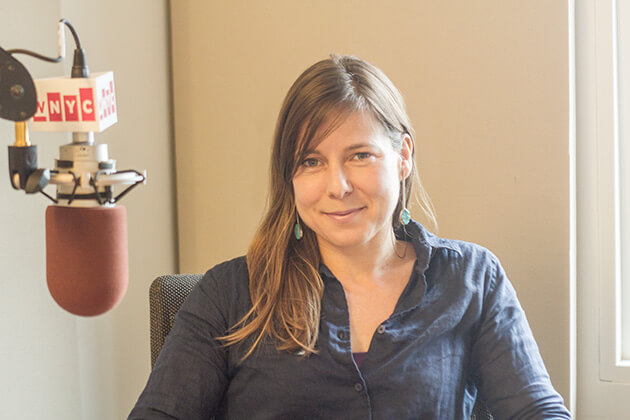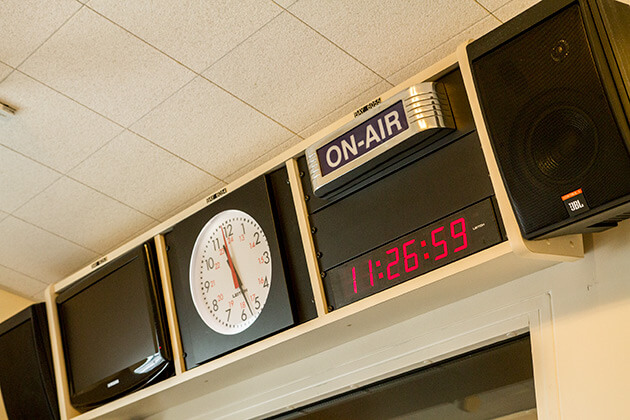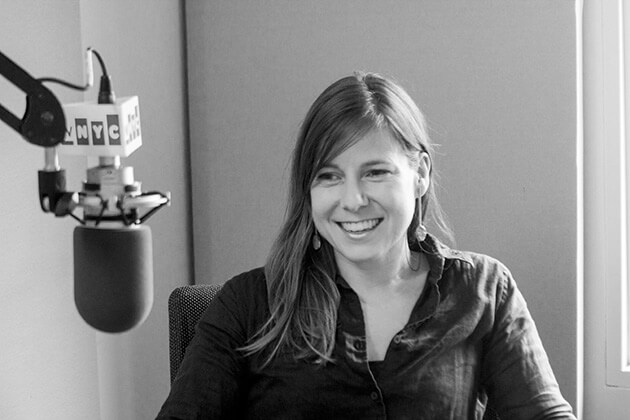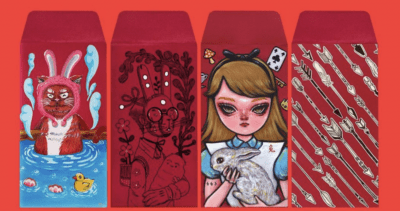Anna Sale, Host of WNYC’s “Death, Sex & Money” Podcast, On Being a Woman on the Airwaves
The generations before us relied on advice columns and the Ann Landers of the world to share in the questions, hopes, dreams and fears of the human experience. This generation Y of Brooklynites relies on podcasts. Bring in the smooth-talking journalist-turned-podcast producer Anna Sale to talk about “Death, Sex, & Money”–the title of her WNYC-produced podcast–and you’ve got honest conversations about deep, personal issues on the airwaves. The fact that Sale has a “public radio voice,” in her words, helps her tackle the big topics of the day. “I like the contrast that I have a kind of a smooth public radio voice, asking a really blunt question about sex,” she said with a small giggle. “I just think is interesting.”
Sale’s mission to bring such tough conversations to light stems from her career as a journalist, working the politics beat. She covered the presidential election in 2012, and Mayor Bill de Blasio’s election in 2013. The idea for Death, Sex & Money grew out of “having very personal conversations with voters about what was going on in their lives–what they were excited for, what the were fearful for,” she said. “[The show] came to me as this way to frame these conversations–let’s just talk about a show where that’s the point, to have these conversations about what’s happening in our lives, and the hard things happening in our lives.”
She soon realized she liked having conversations with voters more than covering political rallies and straw polls. But, Sale says, her natural tendency to have tough, deep conversations as a woman has also been a driving force in the success of Death, Sex & Money, now in its second year. “In some ways, as a woman host, I’m interested in going deep on these personal issues in ways that women have always been, and have had conversations that weren’t part of the media landscape but were happening in the bar among friends, or in the kitchen when dishes were being done–certainly [happening] in my family, for example. I think that being a woman has informed … the argument that these are important journalistic stories to do, and these big personal issues that shape our lives are serious and need to be given space and time to explore.”
Which makes Sale particularly excited to participate in the “Werk It: How To Be a Grown Ass Podcaster” festival this weekend, hosted by WNYC President Laura Walker. It’s the first podcast festival of its kind to be exclusively for women podcasts hosts, who, according to WNYC, make up only 15 of the top 100 podcasts. The sold-out, invite-only event will host workshops and panels for hosts wanting to grow their brands, but also speakers at night (which will be streamed for the public). Sale, who will be a host during the festival, says she’s particularly excited to learn from the other women attending, such as The Daily Show’s Jessica Williams, NPR’s Lulu Miller, and Buzzfeed’s Heben Nigatu and Tracy Clayton. “It feels like it’s time to have a celebration with women in podcasting,” she said.
In fact, Sale got her big break hosting her own podcast by entering a company-wide contest at WNYC to present their big ideas for a show. “I took that as, ‘Oh, now’s your shot to put down on paper what your dream job would be,'” she said. She presented her idea for Death, Sex & Money, and eventually recorded a pilot show. In hindsight, she says, that contest gave her the boost she needed to move forward with her idea. “Particularly as a woman, I don’t think I would have ever knocked on my boss’s door and said, ‘Let me host this show,'” she said. “But because [the contest] was structured as this invitation, it gave me an on-ramp to ‘lean in.'”
Thirty-plus podcasts later, Sale still gets to tackle on the intersection of those three topics, among others. As the show has evolved, she says, it’s been crucial to develop the Death, Sex & Money airwaves as a safe space. “Once you say that you’re going to talk about these taboo things, and once you create that safe space, I think that leads to intimate conversations about death, sex, and money, and a lot of conversations about other things–interesting conversations about race, morality, things like that,” she said. Some of the podcasts that stand out to her? An early episode about living alone, where she found that younger solo inhabitants embraced living alone as a sign of achievement, whereas older generations found themselves living alone as a “result of a rupture” in their lives: divorce, death, loss of a partner. Another episode, during which Sale talked to a married couple about the wife’s struggle with bipolar disorder, opened the floodgates for listeners to share their experiences about suffering from mental disorders. The podcast is “just giving a voice to an experiences that a lot of people face,” she said.
Her years of living in Brooklyn (first in Williamsburg, then in Crown Heights, now in Park Slope) have informed the topics on her show, as well as the tone. “I grew up in West Virginia, and … just part of the Brooklyn experience for me has been, like, ‘Wow, there are lots of different ways that your life could look,'” she said. “On Death, Sex & Money, one of the principles is not making judgment calls about which is better than the other, but being curious about all the different ways our lives look. And that comes from being around all sorts of different Brooklyn families, all sorts of different Brooklyn relationships, all sorts of living arrangements, and just being curious about how they work.”
Sale feels particularly lucky working on Death, Sex & Money for a number of reasons, but by the sheer fact that she’s surrounded by women: her producers are women, her boss (president Laura Walker) is a woman. “I feel like I’m surrounded by women who are bad ass and teaching me things, and that’s great,” she said. Sale thinks back to her initial pitch for the podcast, and gets excited by all of the stories that her fellow women podcast hosts are telling. She reflected on Amy Schumer and her inevitable rise to pop culture: “There’s a reason that Amy Schumer is the hottest thing right now, because it’s like, oh my god, here’s this thing that many women have experienced, but it’s never been a part of the comedy consumption–and it’s time.
“The one [sketch] that I really think about, it was a few episodes ago, but it was a panel of the top women achievers in the world. And they were on a panel together, and they were like, female scientists, and whatever–and they kept saying ‘I’m sorry, I’m sorry.’ They just kept apologizing and saying ‘I’m sorry’ for being on this panel … and it’s so accurate! To have Amy Schumer pointing out, like, we need to push each other to not apologize for having a point of view.”
Werk It: How to Be a Grown Ass Podcaster
with reporting by Juliann DiNicola
You might also like 






















